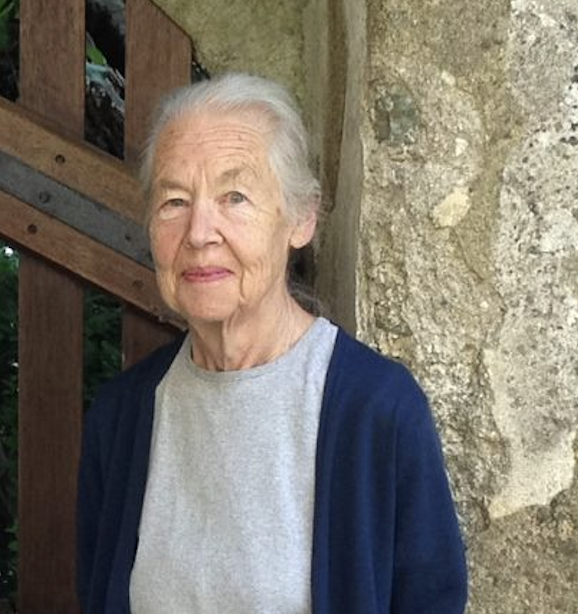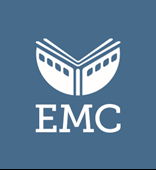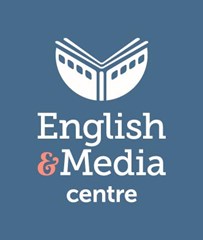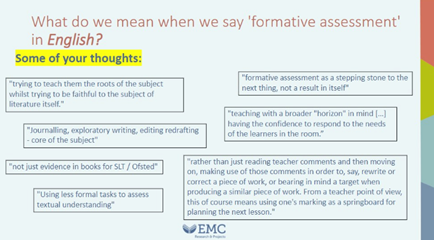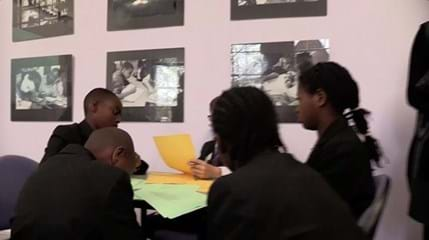Michael Simons, Director of EMC 1975-2013
Jane was involved right at the start of what was then the ILEA English Centre. We managed to persuade the ILEA to offer a professional development course which offered teachers a secondment for one day a week.
Jane was a teacher at Crown Woods School when she involved herself in the first of these courses and played a major role in helping us to devise a model of CPD that focused on the interaction between theory and practice. (John Richmond and Elizabeth Plackett were also on this course!)
As an advisory teacher in the ILEA English team Jane contributed to many publications which drew on her considerable knowledge of literature and children's learning.
Many years later Jane became a Trustee of the newly independent English and Media Centre, a role which she undertook for over twenty years with loyalty and commitment, never missing a meeting and frequently sending the Centre cards to congratulate us on our awards and achievements.
John Hickman, Chair of Trustees at EMC, 2009-2021
I first met Jane during my first NATE conference in Durham in the mid 1970s. At that time she was teaching at Crown Woods School and already had that aura of quiet wisdom that prevailed throughout her years working across so many strands of the English teaching community. Her understated intellect and obvious compassion flowed from her teaching career into every aspect of her involvement with different organisations: L.A.T.E (London Association for the Teaching of English); N.A.T.E; various exam boards; Cambridge University Press; the English and Media Centre where she was a trustee for 23 years and, of course, as the English Inspector in the London Borough of Tower Hamlets.
She seemed to know all that there was to know about subject English and its accompanying system of exams. It could be argued that she became an unassuming inspiration for a generation of London teachers who wanted accessibility, anti-racism, equality and social justice to be a key driver in the decisions made by schools about texts and teaching methodology. As a Chief Examiner she ensured that initiatives like “plain texts” and ideas about coursework were never marginalised either at Exam Boards or in English departments.
Her wide-ranging knowledge and her calm, gentle authority provided a constant source of reassurance for many English teachers at a time when more progressive voices were often seen as a threat by politicians. Her ideas were always greatly valued and her advice much sought-after even in her “retirement” years. She will be sadly missed by all those who knew her.
Barbara Bleiman, previously Co-Director, now Education Consultant at EMC
I first got to know Jane when I was a young teacher through her inspiring work on AEB 660, but was then privileged to work with her on numerous projects at EMC – books such as Text, Reader, Critic and The Modern Novel and several courses for A Level teachers. I also persuaded her (always ridiculously modest!) to write for emagazine and other articles for teachers. She was an absolute font of knowledge and wisdom, whom I frequently turned to for information and advice, particularly on examining in English and student writing but also literary texts, where she had a sharp, insightful intelligence second-to-none. I still use her brilliant ideas, for instance, on how to read long novels.
A ‘highlight’ of our work together was a CPD adventure to Olomouc, in the Czech Republic – an exciting and eventful trip where her purse was stolen at Prague Station, on the return journey she left her passport at the hotel and had to return to collect it, only just catching the flight, and I was in a state of constant anxiety about the very small children I’d left behind for the first time. She was ever good-humoured and able to joke wryly about even the most challenging things. Jane was a very important figure for me in my professional life, but also in the development of English teaching as a whole. So many teachers were influenced by her and learnt from her. She will be greatly missed.
Lucy Webster, Education Consultant at EMC
Sharing thoughts on children’s and young adult fiction was how I first got to know Jane, only weeks after I started work for EMC in 1999 – we were both reading Philip Pullman’s Northern Lights trilogy, Jane with her granddaughter Cora. From that very first meeting, she was an important and influential person to me. I was lucky enough to work with Jane (and Barbara) on our publications Text, Reader, Critic and The Modern Novel – learning a huge amount from both in the process. Years later Jane and I had a lovely time writing a publication on Angela Carter’s Wise Children and running courses on the new Love Through the Ages module. Her approach to A Level Literature and her insights into teaching literature continue to influence me – including in some very practical ways – only this week I sent our Starting to Teach Lit course members her advice on reading long narrative poems. I see that Michael has mentioned the postcards she would send – I still have one sent to me when she retired from being an EMC trustee. It’s a lovely reminder of someone whose unassuming expertise, quiet and generous intelligence and dry sense of humour made her such a pleasure to work with – and learn from.
Simon Gibbons, Reader in English Education, Director of Teacher Education KCL
It was with enormous sadness that I learnt about the recent passing of Jane Ogborn. I first met Jane through the organising committee of the London Association for the Teaching of English (LATE) when I entered the profession in the early 1990s. Jane was a key member of LATE and her wise and incisive contributions to meetings revealed not just the depth and breadth of her experience, but also her unerring ability to get straight to the heart of critical issues and cut through the rhetoric of policymakers and their statements about the subject. Later, when I began marking A level papers, Jane saw to it that I was invited to become a senior examiner and team leader; it was her backing that gave me the confidence to take on the role though, in reality, I had scant experience for the task. When I came to write my book English and its Teachers, I interviewed Jane as part of the research; she was generous with her time and her knowledge of English curriculum and assessment, and their contested histories, was invaluable to me. Jane even left me the keys to her house when she was on holiday so that I could plunder her extensive archive of English documents and publications for my work. I had enormous respect for Jane; she was wise and authoritative, but also often revealed a razor sharp wit and devilish sense of humour in her comments. She was incredibly supportive and encouraging of her colleagues, many of whose careers – like mine – will have been immeasurably enriched by having worked with her.
Gwen Evans – Crown Woods School 1968-1977
Jane returned to teaching in 1973 after a career break and joined the 20-strong Crown Woods English department initially as a part-timer; she came with an encyclopaedic knowledge of children’s literature, volunteer experience in adult literacy and active membership of CASE (the Campaign for State Education). It wasn’t long before she was running the school bookshop with a team of pupil assistants and had become the go-to person for colleagues searching for materials to capture the interest of the reluctant reader or recalcitrant writer. In the 70s Crown Woods mode 2 CSE meant that teachers chose the set books and the final literature paper was Open Book. OL and AL students weren’t so lucky: their exam fare was rather unexciting. Under Jane’s guidance that changed. English Language become 50% coursework and English Literature Open Book. An innovative 50% coursework AL then followed. Jane was central in resourcing these changes and in supporting colleagues as they developed the planning and assessment skills required.
For Jane it was a logical step to become increasingly involved in the whole exam process. She became an exam marker, then team leader, a coursework consortium co-ordinator, and a Co-Chief Examiner for one of the innovative courses. At the same time she was instrumental in fostering her colleagues’ own career development consistently being both demanding and encouraging.
In time she moved on from heading the Crown Woods department to work in an advisory and inspectorial capacity for ILEA. She was the English specialist in the IBIS team. It was a highly innovative team that combined both inspection judgment with ongoing school support. Post IBIS she worked in the advisory team for Tower Hamlets – and then came OFSTED. Her inspection reports were known for being strictly fair and consistent – indeed just like her teaching and marking!
And even after she left Crown Woods, past pupils would keep in touch and tell her how they were getting on. It was a lucky day for the world of English teaching when Jane Ogborn decided it was time to return to the profession all those years ago.

